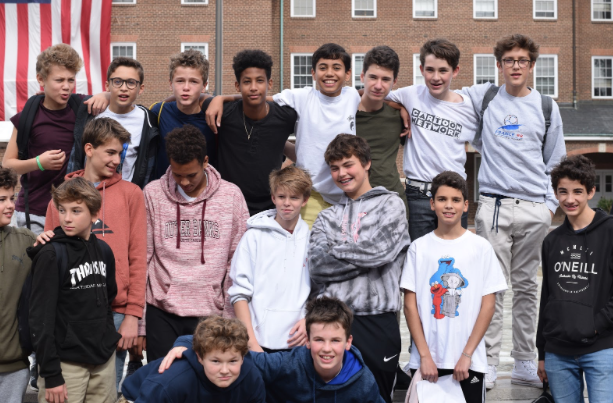It’s highly likely that at some point in the lives of students, they will experience or witness a form of bullying in their school environment. However, according to a survey sent out to the Middle School, fewer than half of the 35 students who responded have actually reported it in the past. Whether this is due to students not reporting incidents or the perception that the administration is not undertaking issues reported, the reason is debatable.
The Community Handbook states, “If bullying does occur, all students are encouraged and expected to tell an adult immediately. Incidences reported to a member of the school community will be dealt with promptly and effectively.” WIS’ protocol involves reporting the bullying, an investigation into whether or not the bullying accusations are valid, students working together to stop the bullying, and appropriate consequences levied with the students involved.
The Middle School Principal, Mr. Randy Althaus, explained a bit more about the administrative point of view and how the WIS bullying protocol works. Althaus referenced the WIS Community Handbook which states, “If a student feels that he or she has been a target of bullying or has witnessed bullying actions towards a peer, the student should alert an adult as soon as possible.”
Althaus believes that the administration’s approach to bullying is working to help reduce the problem. “When it does happen, it is very appropriate and effective,” he said. However he can also imagine that there is a lot of bullying that goes unreported. He also explained that usually students won’t even come to him, at least not at first, but prefer to confide in adults such as the school counselors, Ms. Marilyn Wilson Odhiambo and Ms. Anne Hutchinson.
“When people are being bullied the thing they fear most is… repercussions and the situation getting worse,” Althaus states. He thinks students don’t confide in him because he will be too confrontational. Immediate action is often not taken. However, Althaus made it very clear that this is because a thorough investigations has to take place before the administration gets involved.
Overall, the WIS administration believes that the bullying protocol is effective, but each situation warrants a separate response. Counselor Ms. Wilson Odhiambo believes that there is “no exact way” to help students deal with bullying and that “each student has a different way that they want [their situation] handled”. In addition, she works towards helping the victim of bullying “feel more confident and empowered in how they can handle the situation.”
When asked what she thought needed to be improved at WIS in order to help minimize bullying, she explained that students and faculty would need to work together but that a lot of the change needs to come from students.
“I would like to see more upstanders, more students stand up for someone they see is being mistreated or bullied,” said Ms. Wilson Odhiambo, “instead of the target always having to report for themselves. Kids at WIS know which kids are targeted or which kids are picked on, and I would love to see more [students] coming forward on behalf of their peers,” she said.
While the administration seems to believe that the protocol for bullying is effective when needed, some students disagree. In response to a survey sent out mid-March that gathered responses from 35 middle school students, the general student sentiment was dissatisfaction with how the administration handles bullying. Students felt that after investigations were carried out, bullies didn’t face enough consequences for their actions and in some cases felt that the bully’s apology was not genuine. Whether or not these responses correlate exactly with the bullies’ consequences, there is clearly a feeling of frustration with the way the administration handled their situation.
When interviewing one student about her experience with bullying at WIS, she shared her opinion about the way WIS handled her case with Dateline. She initially met with Ms. Wilson Odhiambo who told her she needed to tell Mr. Althaus and Mr. Beck about the bullying as they would dictate the punishment.
According to the student, after discussing the issue with the administration, the situation worsened, and her parents eventually had to get involved. But the student expressed her dissatisfaction with the outcome of the situation. The student felt that the punishment was not severe enough, and that the bully’s apology was half-hearted. The accused bully did not respond for comment.
However, students don’t know the full extent of the disciplinary actions the administrations takes, and this may be part of the problem. Should punishment be more transparent? Should WIS be more open about these bullying cases?
Althaus explained that being transparent with regard to punishment can create moral issues. “We’re not going to share peoples’ punishments and consequences with the whole community. What is important is if the behavior stops.” Althaus stated that this is a time for trial and error, that a student’s actions in Middle School should not reflect their personality or creates a reputation that follows them through the rest of their student career.
Althaus states that many of those who report bullying expect to see action from the administration. “When students and parents report something they want blood. They want to know what exactly is going to be done, how severe the punishment is going to be, we can’t do that” he said.
Althaus made it clear that even the victims of the bullying will not learn of their bullies’ consequences. “They won’t fully know that because we don’t share,” Althaus said. His main goal is to make sure that the dynamic between the victim and the bully changes in a positive manner, not to focus on the disciplinary matters and to keep all the information private. His stance on bullying cases in the Middle School involves no sharing of information between students.
In addition, the only way to inform the administration of incidents of bullying is through reporting the incident in person. Again, the Community Handbook states that “if a student feels that he or she has been a target of bullying or has witnessed bullying actions toward a peer, the student should alert an adult as soon as possible.” However, Althaus is working to improve the reporting system next year. “One of the things we are trying to do is trying to provide more opportunities for kids to be able to report anonymously some bullying behavior so that we can help address [that].”
One possible solution to improve the situation could be the creation of an Honor Council-like system. Consisting of students and a faculty mentor, the council could create the disciplinary course of action in cases of bullying and suggest it to the administration. Implementing this council into the Middle School could create a more engaged and collaborative relationship between the administration and the students. Completely eradicating bullying at WIS is something that could only happen in a perfect world, but minimizing it as much as possible requires teamwork between students and staff members alike.
By Maia Nehme and Abigail Bown


































































